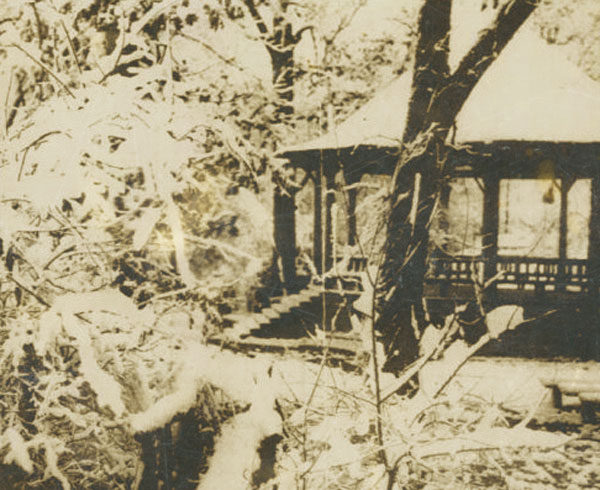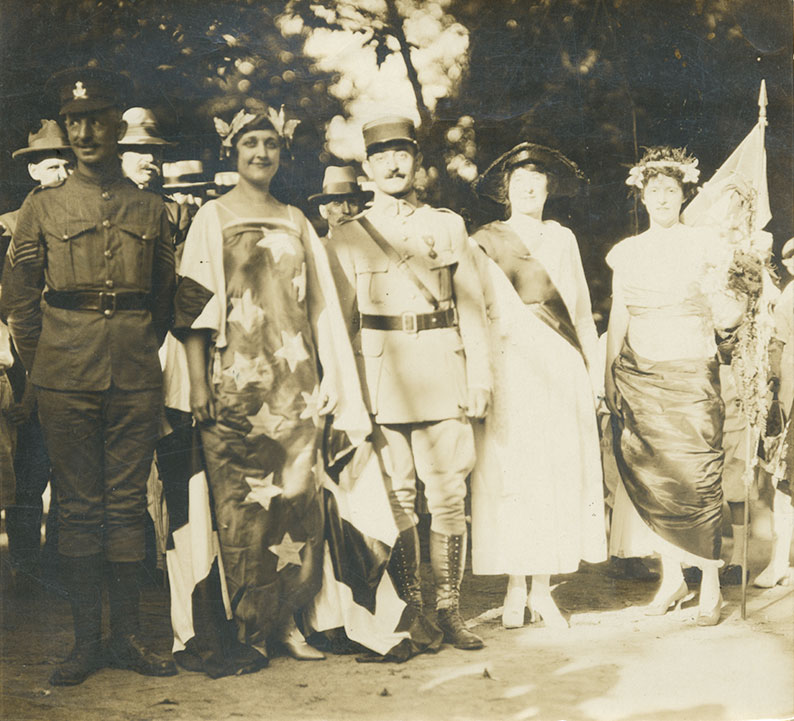Murrah, Corrine
Memphis, Tennessee
- Wife of:
- Captian William F. Murrah
- 118 Infantry Regiment, 30th Division, American Expeditionary Force
- Somewhere in France1
Introduction
MEMPHIS CELEBRATES THE FALL OF THE BASTILE
Thousands Gather at Overton Park for Big Celebration
ENTHUSIASM TREMENDOUS
Catptain Montaland Given Splendid Ovation as He Voices France's Gratitude for American Aid - Patriotic Pageant Presented
Folllowing the celebration of July 14, 1918, The Commercial Appeal wrote,
“Memphians paid a splendid tribute to France’s national holiday yesterday afternoon at Overton Park when 5,000 people gathered to celebrate the fall of the Bastile. A splendid patriotic parade and program were presented under the direction of the Memphis division, Women’s Council of National Defence and the Fatherless Children of France Society.”
Cast-Iron Bandstand in Winter in Overton Park (This cast-iron bandstand stood on the site of Brooks Memorial Art Gallery from 1904 to 1926 and was demolished in 1926 as space for the Art Gallery)
The program at the bandstand in Overton Park was preceded by a parade led by five veterans of the Civil War - soldiers of the Confederacy followed by school children, Boy and Girl Scouts, soldiers and sailors. Many school children carried banners proclaiming their support for the French orphans.
Miss Edna Arrington, impersonated Joan of Arc and rode directly ahead of the motor carrying French Capt. Montaland. She was escorted by an honor guard of soldiers and marines, including members of the Royal Berkshire Regiment and the Scotch Guards.
Captain Montaland of the French high commission, was the guest of honor at the celebration. He rode in an automobile escorted by two beautiful Memphis girls, costumed as Columbia (Mrs. William F. (Corrine) Murrah) and La Belle France (Mrs. Homer K. Jones). The tri-color of France and the lilies of France were carried in the car.
The procession began at 1 p.m. from the Poplar Avenue entrance of the park and drove past the Japanese gardens - being reviewed there by Maj. S.S. Frost, grand marshal of the day - to the bandstand, where it disbanded.
Capt. Montaland briefly sketched the conditions leading up to the fall of the Bastile, what that action meant to France, and how France’s alliance with America would strengthen the democracy of not only France, but all the nations of the Allies. Capt. Montaland voiced the gratitude of France for America’s aid and pledged the undying determination of the French people to fight out the war until victory has been won and the world made safe for democracy.
“I thank you all for this fine demonstration which you have given here today, attesting your love of France, and your desire to celebrate our national holiday, and I would assure you that France is indeed grateful for your splendid aid in arms and for the fine spirit of help and co-operation which you are showing, not only today but every day by both words and deeds.”
“American and French soldiers will fight shoulder to shoulder until the war, with its bitter desolation, ruin and hardships, should be carried back into Germany so that the Germans might feel what war really is. They must suffer as France has suffered for they have earned it, and they shall surely be paid.”
“Our chances of victory were dark before America stepped in to aid us, but now they are bright, and we shall fight together until we have won the victory we so justly deserve.”2
Jules Gargaro singing the “Marseillaise” to the accompaniment of Prof. White’s Municipal Band while Corrine and Mrs. Homer K. Jones pose as “Columbia” and “France”
Corrine's Letter
The following Saturday, July 20th, Corrine wrote to her husband Captain William F. Murrah (Letter No. 34) stationed somewhere in France.
“I am enclosing two pictures that were taken at the Celebration of “Bastille Day” last Sunday afternoon. I didn’t know that I could get these until today. They were taken for the News Scimitar, and I never gave it a thought.”3
Corrine continues,
“In the picture on the bandstand, Mr. Jules Gargaro is singing the “Marseillaise”, and Mrs. Jones and I are posing - we are holding hands, yet you can’t see, as he is in front. That is Capt. Montaland, the Frenchman, guest of honor, to the left of me, and old Mrs. Denny is on Mrs. Jones’ right. Old man Lake is in the background, just to Mrs. Jones left. Jim Dockery’s father was standing back there somewhere, too.”
Portion of Corrine’s Letter of July 20, 1918
“My costume is blue satin with silver stars, and the red and white satin stripes at the back are fastened at the shoulders and to the end of my fingers, so when I hold out my arms it makes a beautiful background for the body of the dress. I wore silver leaves in my hair and silver slippers.”3
Bolton Smith, in delivering the address of welcome, made a plea for support of the movement supporting thousands of fatherless children in France. The patriotic event was brought to a close when Professor E.K. White’s municipal band played “The Star Spangled Banner.”4
Corrine as “Columbia”
“In this picture, Capt. Montaland is in the center, Mrs. Fairfax Proudfit Williamson (she got up the program) on his right, and Mrs. Jones next to her. I guess you can recognize your wife all right - I don’t remember who the ugly English man is standing next to me.”5
Captain William F. Murrah of the 118 Infantry Regiment, 30th Division, and American Expeditionary Force returned home after the war, they had three children and he pursued a successful law practice. Many patriotic wives demonstrated a winning spirit for their country while their husbands were fighting abroad in WWI.
References
- Letter of Corrine Murrah, July 20, 1918
- Memphis Commercial Appeal, July 15, 1918, Memphis Celebrates Fall of the Bastile
- Letter of Corrine Murrah, July 20, 1918
- Memphis Commercial Appeal, July 15, 1918, Memphis Celebrates Fall of the Bastile
- Letter of Corrine Murrah, July 20, 1918
Image Credits
- Memphis Press Scimitar Image with Letter
- http://historic-memphis.com/memphis-historic/overtonpark/overtonpark.html
- Memphis Press Scimitar Image with Letter
- Corrine Murrah’s Letter to Captain William F. Murrah, July 20, 1918
- Memphis Press Scimitar Image with Letter






